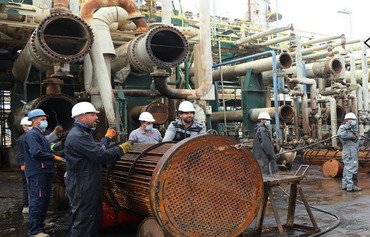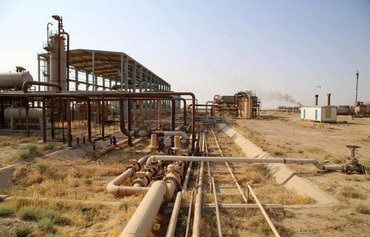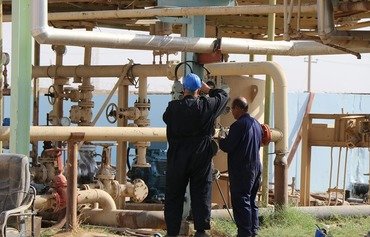Four years after being knocked out of service by the "Islamic State of Iraq and Syria" (ISIS) incursion, the flame is once again burning atop the flare stack in Salaheddine province's Baiji oil refinery.
The area around the refinery became a battlefield in July 2014, after it was surrounded by ISIS elements advancing from cities in northern Iraq who attempted to storm it with trucks and cars rigged with explosives.
The Iraqi Counter-Terrorism Service forces stationed inside held fast, however.
They received support via an air bridge after ISIS tightened its siege around the refinery, and were able to defend it for months, until the city of Baiji near the refinery was liberated and the group was fully expelled from the area.
Raad Hamoudi al-Hamdani, an engineer who worked at the refinery at the time, recalled the difficulty of those days.
"The situation was very serious and we were forced to gradually stop operations at the refinery," he told Diyaruna. "A number of engineers and staff members were killed in the clashes."
Al-Hamdani was among those who were forced to flee for the Kurdish region.
"We wept bitterly whenever we watched the news about the refinery on television and saw how car bombs blew up at its gates every day and how it was destroyed," he said.
"Today, however, we have succeeded in overcoming all of those adversities, and the technical teams of national companies have gradually rendered the refinery operational," he added.
Engineers and technical staff worked around the clock to get operations back up and running at the refinery, which is the main source of livelihood for residents in the Baiji district, and a key economic resource for Iraq, he said.
Salaheddine 2 unit opens
The refinery will officially restart operations at Baiji's Salaheddine 2 unit this month, oil ministry spokesman Assem Jihad told Diyaruna.
Salaheddine 2 will be the first unit to resume operations at the refinery, he said, adding that it "will be officially and fully opened very soon", at a capacity of 70,000 barrels per day.
"All the work to rehabilitate and get the refinery back up and running was conducted by national workers through the North Oil Company, Oil Projects Company and other authorities supporting it with self-financing and at a relatively limited cost," he said.
The next phase will involve rehabilitating the Salaheddine 1 unit, which has the same capacity, Jihad said, followed by the rest of the refinery’s units, until the refinery’s total production capacity reaches more than 300,000 barrels per day.
Returning the units to operation will "boost the national production of oil derivatives and help Iraq save millions of dollars that it is spending on imports", he said, adding that it will supply power plants in the country with fuel.
"The priority in getting the refinery units operational is set based on the amount of damage to each unit and availability of raw materials in the country," he said.
Boosting national economy
"Reopening the refinery will have a positive impact on the economic situation in the province in particular, and the country in general," said Salaheddine provincial council chairman Khalid al-Khazraji.
The refinery will employ hundreds of workers, provide residents and gas stations with critical oil derivatives, and supply power plants and privately-owned generators with fuel, he told Diyaruna.
This will boost the generation of electricity in the province, he said.
The positive economic consequences also will boost the national economy, al-Khazraji added, noting that before ISIS overran Baiji, the refinery supplied Iraq with about 60% of its oil derivative needs.
"If it becomes fully operational once again, it would provide considerable economic services to the northern provinces," he said.

![Four years after being knocked out of service by the 'Islamic State of Iraq and Syria' incursion, the flame is once again burning atop the flare stack in Salaheddine's Baiji oil refinery. [Photo from the Baiji oil refinery Facebook page]](/cnmi_di/images/2018/09/05/14176-Baiji-refinery-flame-600_384.jpg)






